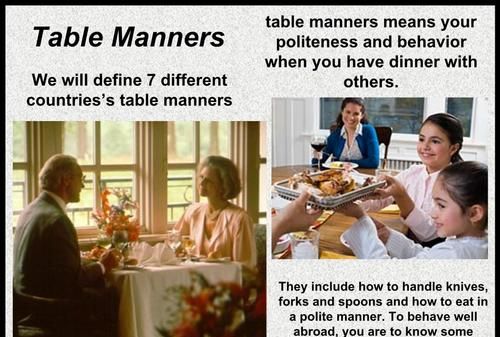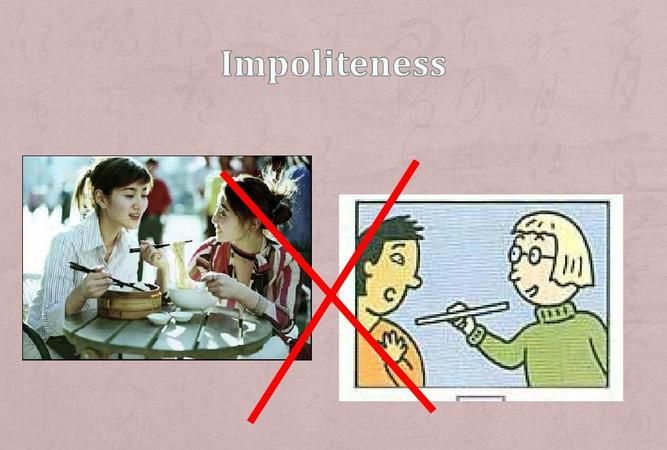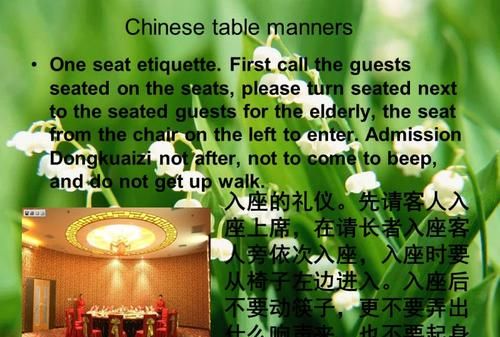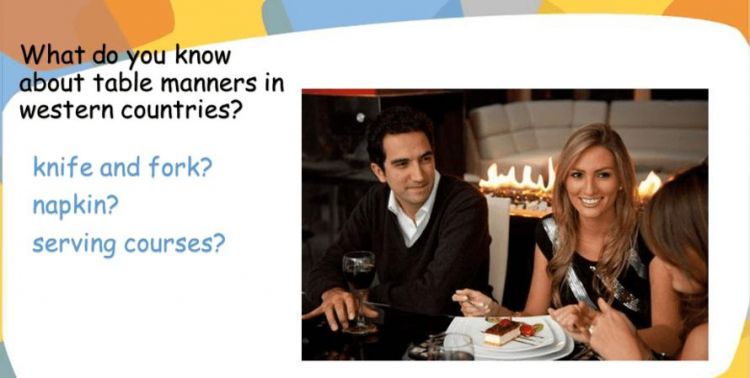本文目录
关于中国餐桌礼仪的英语作文初三
不清楚你的详细要求,这个是详细版本,可以自行缩减
Generally, Chinese table manners are more informal than the West, although there are more rules concerning interactions with other guests due to high levels of social interaction as a result of the communal style of serving.
Chopstick usage
Chopsticks should always be held correctly, i.e. between the thumb and first two fingers of the right hand.
When not in use, chopsticks must always be placed neatly on the table with two sticks lying tidily next to each other at both ends. Never point the chopsticks at another person. This amounts to insulting that person and is a major faux pas.
Never wave your chopsticks around as if they were an extension of your hand gestures.
Never bang chopsticks like drumsticks. This is akin to telling others at the table you are a beggar.
Never suck the chopsticks.
Decide what to pick up before reaching with chopsticks, instead of hovering them over or rummaging through dishes.
To keep chopsticks off the table, they can be rested horizontally on one's plate or bowl; a chopstick rest (commonly found in restaurants) can also be used.
When picking up a piece of food, never use the tips of your chopsticks to penetrate the food as with a fork; exceptions include tearing apart larger items such as vegetables. In more informal settings, smaller items or those more difficult to pick up such as cherry tomatoes or fishballs may be stabbed, but this is frowned upon by traditionalists.
Never stab chopsticks vertically into a bowl of rice, as this resembles incense sticks used at temples to pay respects to the deceased. This is considered the ultimate dinner table faux pas.
Communal chopsticks
When there are communal chopsticks, it is considered impolite to use your own chopsticks to pick up the food from the shared plate, or to eat using the communal chopsticks.
It is considered impolite to use the blunt end of one's own chopsticks to transfer food from a common dish to one's own plate or bowl; use the communal chopsticks instead.
When communal chopsticks are not provided, it is considered polite (and sanitary) to use the blunt end of one's own chopsticks to serve a guest by transferring food from the common dish to a guest's plate or bowl.
An exception to the above can usually be made in intimate settings such as at home.
Other utensils
If noodle soup is served, many consider a more elegant way to eat by picking the noodle into a serving spoon first, and eating from the spoon, rather than slurping directly from the bowl into the mouth using chopsticks.
Chinese traditionally eat rice from a small bowl held in the left hand, however by no means is this good etiquette. It is believed this is the way most people eat but not at all an indication of how it should be done. The rice bowl is raised to the mouth and the rice pushed into the mouth using the chopsticks. Some Chinese find it offensive to scoop rice from the bowl using a spoon. If rice is served on a plate, as is more common in the West, it is acceptable and more practical to eat it with a fork or spoon. The thumb must always be above the edge of the bowl.
Eating from common dishes
Pick the food on the dish that is at the top and nearest to you in distance. Never rummage through the dish or pick from the far side for your favorite food.
In general, more conservative Chinese frown upon the practice of picking more than one or two bites of food in your bowl or serving plate as if you were eating in the Western way. Most Chinese would understand the practice during infectious disease epidemics, or if the person is from the West.
If both a serving bowl - separate from rice bowl - and plate are provided, never put any food items to be eaten onto the serving plate. This rule may be relaxed for foreigners.
If a dish is soupy, pull the serving bowl near the serving dish and reduce the distance the chopsticks need carrying the food. Spilling plenty of sauce on the table is a major faux pas.
After you have picked up a food item, do not put it back in the dish.
Seniority and guests at the table
The elderly or guest(s) of honour are usually the first to start the meal.
The youngest or least senior may serve the eldest or most senior first, as part of the Confucian value of respecting seniors.
The youngest on the table addresses all of the elder members at the table before starting, perhaps telling them to please "eat rice" as a signal to help themselves.
The best food in a dish should be left to the elderly, children, or the guest of honour, even if they are one's favourite.
The eldest person present, or the guest of honour, is given a seat facing the door.
When the hostess says her food is not good enough, the guest must disagree and tell her it is one of the finest foods they have ever tasted.
Drinks
The host should always make sure everyone's cups are not empty for long. One should not pour for oneself, but if thirsty should first offer to pour for a neighbor. When your drink is being poured, you should say "thank you", and/or tap your index and middle finger on the table to show appreciation, especially when you are in Southern China, e.g. Guangdong Province. This action is evocative of bowing your head.
When people wish to clink drinks together in the form of a cheer, it is important to observe that younger members should clink the rim of their glass below the rim of an elder's to show respect.
Strong alcohol, called baijiu, is often served throughout the meal; and it is customary for the host[s]/hostess[es] to insist that guests drink to "show friendship." If the guests prefers not to drink, they may say, "I'm unable to drink, but thank you." [in Mandarin: "Wo bu neng he jiu, xie xie."] The host may continue to insist that the guests drink, and the guests may likewise continue to insist upon being "unable" to drink. The host's insistance is to show generosity. Therefore, refusal by the guests should be made with utmost politeness. Beware: If a guest drinks alcohol with a subordinate at the table, the guest will be expected [if not forced] to drink a glass of the same alcohol with each superior at that table, and possibly at other tables too—if the guest has not passed out yet.
Smoking
Smoking is an extremely prevalent habit in China, especially among men. During meals, the host will sometimes pass out cigarettes to all the men around the table. If a guest prefers not to smoke, she/he should politely refuse. In Mandarin, one could say, "我不抽烟,谢谢" (Wo bu chou yan, xie xie).
Business meals
During business meals, it is best not to eat to the point of satiation, as business and not food is the actual main purpose of the gathering.
Miscellaneous
In the past, some people tended to sit at least 1 metre (3 chi) from the dining table so they would not be literally rubbing elbows with other guests. Nowadays, this practice is rarely observed.
When eating food that contains bones, it is common for the bones be spat out onto the table next to one's plate. Spitting bones onto the floor is almost never acceptable.
Belching, smacking, and slurping are common.
By Western standards, the conversations during meals often are quite loud and animated.
Treatment of staff at restaurants is somewhat "rough," with waiters/waitresses often being advised by patrons to 快点 (kuai dian), which means "hurry up."
Talking with a full mouth and eating with the elbows on the table are both very common, and tasting food from a table guest's plate is also not uncommon.

介绍一些餐桌礼仪英文
Chinese table manners of families have no intrinsic quality even there are different region and position. No matter three meals a day or guest’s arrival, always bowls with chopsticks, food with soup. There is no rule for how to put the tableware. What people care about more are not the gorgeous tableware but the sumptuous food. People’s dining position reflects the most obvious etiquette of Chinese table manners. In ancient society, men are supreme, and women are not allowed to sit with men on the same table. Although this is modern society, this kind of ancient etiquette still remains. Today in China, the phenomenon that men sit on the table before women can be found everywhere. The master of a family usually sits on the first-class seat. The first-class seat is usually near the interior of a room facing to the door. Once there is a guest, the master will offer the first-class seat to the guest politely. If it is an ordinary meal of family, families should start after the elder. If there is a guest, the master offer the food to the guest is essential from the beginning to the end. And the tradition of urging others to drink is also a special phenomenon.
中国就餐举止 家庭中国就餐举止没有内在质量甚而那里是另外区域并且安置。 问题三饭食每天或客人的到来,总不滚保龄球与筷子,食物用汤。 没有规则为了怎样能投入碗筷。 什么人关心关于更多是没有华美的碗筷,而是奢侈食物。 人的用餐的位置反射中国就餐举止最明显的礼节。 在古老社会,人是至尊,并且妇女不允许坐与人在同一张桌。 虽然这是现代社会,这种古老礼节仍然依然存在。 今天在中国,人坐桌的现象,在妇女可以找到到处之前。 家庭的大师通常坐头等位子。 头等位子通常在面对对门的屋子的内部附近。 一旦有客人,大师为客人将礼貌地提供头等位子。 如果它是家庭一顿普通的膳食,家庭应该在长辈以后开始。 如果有客人,主要提议食物对客人对末端从开始是根本的。 并且敦促其他的传统喝也是一种特别现象。

关于餐桌礼仪的英语作文带翻译
TABLE
MANNERS
AT
A
DINNER
PARTY:
宴会上的餐桌礼仪.There
are
two
pairs
of
knives
and
forks
on
the
table,
桌子上有两双刀叉Forks
on
the
left
and
knives
in
the
right
of
the
plate.叉子放在盘子的左边,刀子放在右边When
you
see
two
spoons,
the
big
one
id
for
the
soup
and
the
small
one
for
the
dessert.
你能看到两个勺子,大的是为了盛汤,小的为了甜点。
For
the
starter,
which
you
eat
with
the
smaller
pair,
开始时候你用小的那对吃you
keep
the
knife
in
your
right
hand
and
the
fork
in
your
left.保持着左手叉右手刀The
next
dish
is
the
main
course.下一道菜是主菜。At
table
,you
should
try
to
speak
quietly
and
smile
a
lot,but
do
not
laugh
all
the
time.
在桌子上你应该试着轻声的说话,并且常常微笑,不要一直笑,Table
manners
change
over
time.餐桌礼仪总是在变They
follow
the
fashion
of
the
day
.他们随着时代改变

中国餐桌礼仪英语作文
Chinese table manners of families have no intrinsic quality even there are different region and position. No matter three meals a day or guest’s arrival, always bowls with chopsticks, food with soup. There is no rule for how to put the tableware. What people care about more are not the gorgeous tableware but the sumptuous food. People’s dining position reflects the most obvious etiquette of Chinese table manners. In ancient society, men are supreme, and women are not allowed to sit with men on the same table. Although this is modern society, this kind of ancient etiquette still remains. Today in China, the phenomenon that men sit on the table before women can be found everywhere. The master of a family usually sits on the first-class seat. The first-class seat is usually near the interior of a room facing to the door. Once there is a guest, the master will offer the first-class seat to the guest politely. If it is an ordinary meal of family, families should start after the elder. If there is a guest, the master offer the food to the guest is essential from the beginning to the end. And the tradition of urging others to drink is also a special phenomenon.
中国就餐举止 家庭中国就餐举止没有内在质量甚而那里是另外区域并且安置。 问题三饭食每天或客人的到来,总不滚保龄球与筷子,食物用汤。 没有规则为了怎样能投入碗筷。 什么人关心关于更多是没有华美的碗筷,而是奢侈食物。 人的用餐的位置反射中国就餐举止最明显的礼节。 在古老社会,人是至尊,并且妇女不允许坐与人在同一张桌。 虽然这是现代社会,这种古老礼节仍然依然存在。 今天在中国,人坐桌的现象,在妇女可以找到到处之前。 家庭的大师通常坐头等位子。 头等位子通常在面对对门的屋子的内部附近。 一旦有客人,大师为客人将礼貌地提供头等位子。 如果它是家庭一顿普通的膳食,家庭应该在长辈以后开始。 如果有客人,主要提议食物对客人对末端从开始是根本的。 并且敦促其他的传统喝也是一种特别现象。

以上就是关于关于餐桌礼仪的好处英语 ,关于中国餐桌礼仪的英语作文初三的全部内容,以及关于餐桌礼仪的好处英语 的相关内容,希望能够帮到您。

